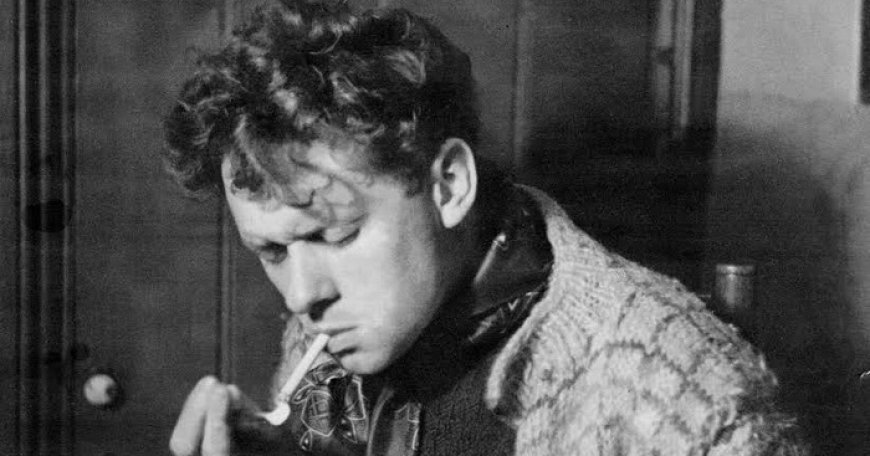Why Did Dylan Thomas Write Do Not Go Gentle?
Dylan Thomas was a poet of passion, rhythm, and lyrical brilliance. His poetry explored themes of life, death, love, and memory with great intensity.

Dylan Thomas?was a poet of passion, rhythm, and lyrical brilliance. His poetry explored themes of life, death, love, and memory with great intensity. Among all his poems,Do Not Go Gentle into That Good Nightstands as one of his most famous and most deeply personal works. It is widely read and quoted, especially in moments of loss or reflection.
The poem is a villanelle. This form uses repeated lines and a strict rhyme scheme. It is a traditional form, but Dylan Thomas used it to create something striking and emotional. The poem urges the readerand especially the speakers fathernot to die passively. It demands that life be held onto, even in the final moments. The poet tells us to rage against the dying of the light.
This article explores why Dylan Thomas wrote this powerful poem. We will look at the context of his life, the health of his father, the form of the poem, and the emotions that inspired it. Through this journey, we see how poetry becomes a tool of expression, resistance, and love.
Dylan Thomas and His Relationship with His Father
To understand the poem, we must first understand Dylan Thomass relationship with his father, David John Thomas. His father was a schoolteacher and a man of learning. He loved literature and poetry. In fact, he read Shakespeare aloud in their home and shared books with his son. He helped shape Dylans love for words.
But in later years, David Thomas became very ill. His health declined, and his strength faded. This change was hard for Dylan. He had seen his father as strong and full of life. Now, he watched him grow weaker, closer to death.
Do Not Go Gentle into That Good Nightwas written during this painful time. Dylan Thomas wrote it as a response to his fathers approaching death. The poem is not only about death itself. It is about how one faces death. It is about resisting the end, even when it seems inevitable. It is a plea. It is a cry of grief. But it is also a form of praisepraise for life, for strength, and for courage.
The Meaning of the Repeated Lines
The poem repeats two important lines. One is Do not go gentle into that good night. The other is Rage, rage against the dying of the light. These lines appear several times and form the backbone of the poems structure. They give the poem urgency and emotional force.
The phrase that good night is a metaphor for death. Dylan Thomas calls it good, perhaps to suggest peace or final rest. But he does not want his father to accept it quietly. The word gentle means soft, calm, or passive. Thomas says, do not go this way. Do not simply let death take you. Fight. Resist.
The second repeated line uses the word rage. This word gives the poem fire. It is not just sadnessit is anger. It is struggle. The dying of the light is another metaphor for death. Light stands for life, vision, and energy. Thomas wants his father to rage against its loss.
These two lines together show the core message of the poem. Dylan Thomas wanted his father to hold on to life, to resist deaths silence. He did not want him to fade away. He wanted him to go down fighting.
The Poems Structure and How It Adds Emotion
Do Not Go Gentle into That Good Nightis a villanelle. This is a poem with nineteen lines, five tercets (three-line stanzas), and a final quatrain (four-line stanza). The first and third lines of the poem are repeated alternately at the end of each tercet and then both appear at the end of the quatrain.
This repetition creates a chant-like rhythm. It builds intensity as the poem moves forward. The form also mirrors the poems theme. The fight against death is ongoing, repeated, and unyielding. The structure gives the poem strength and order, even as it deals with grief and chaos.
Dylan Thomas used this formal shape to contain his emotions. Inside this tight structure, he poured wild passion. The balance between form and feeling gives the poem its lasting power.
Different Kinds of Men and How They Face Death
In the poem, Thomas speaks of several types of men. He mentions wise men, good men, wild men, and grave men. Each kind of man faces death in his own way. Each one resists it for different reasons.
Wise men know that death is coming, but they do not accept it quietly. Good men cry because their deeds were not enough. Wild men lived fully and now grieve the end. Grave men, near death, still find light and passion in their final hours.
These examples show that all people, no matter their nature, resist death. Thomas uses them to show that his father should also fight. It is not shameful to resist. It is human. It is noble.
This section also gives the poem a universal tone. Though written for his father, the poem speaks to everyone. It says that no matter who you are, your life matters. Your fight matters. Your ending should be full of spirit.
Love, Grief, and the Final Plea
In the last stanza, Thomas speaks directly to his father. This moment is the most personal part of the poem. He says, And you, my father, there on the sad height. The sad height is deaths edge, a lonely and elevated place.
He asks his father to curse or bless him with wild tears. These lines show deep emotion. The poet wants a sign, any sign, of passion. He wants to see life, even at the end. He ends the poem with the repeated lines once more. His voice is louder. His heart is more exposed.
This ending shows how love and grief can live together. The poem is not just about fear. It is also about connection. It is the sons final plea to the father. It is the poets cry to the world.
Conclusion: A Poem of Resistance and Devotion
Dylan Thomas wroteDo Not Go Gentle into That Good Nightbecause he was losing his father. He wrote it to express his pain, his love, and his desire for strength. The poem is a request, a protest, and a tribute all at once.
Its form gave it order. Its language gave it passion. Its message gave it life. Dylan Thomas turned a private moment of sorrow into a universal poem. He showed that poetry can hold our hardest emotions. He showed that even in the face of death, we can speak boldly.
This poem remains powerful because it is honest. It does not hide from death. It does not hide from love. It brings them together in lines that still echo, still inspire, and still make us feel.

























